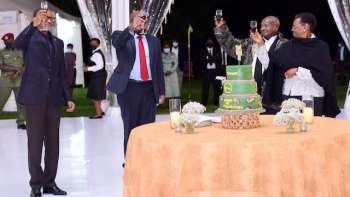On June 13, 2011, in a statement at the African Union in Addis Abeba, Ethiopia the US Secretary of State, Hillary Clinton challenged African leaders to promote democracy, economic growth, and peace and security.
".. the United States seeks new and dynamic partnerships with African peoples, nations, and institutions. We want to help you accelerate the advances that are underway in many places and collaborate with you to reverse the dangerous trends and encourage political, economic, and social progress, " said the US Secretary of State.
The Secretary of State praised the countries of Botswana, Ghana, and Tanzania for being the role models of democracy in Sub-Sahara Africa and
invited their neighbors to emulate their example. She also cited Nigeria, Malawi, Benin, Niger, Kenya, Guinea and even Ivory Coast for making strides towards democracy.
This week, Nigeria has shown that it has made another step. A big one. President Jonathan Goodluck has conceeded to General Muhammadu Buhari, after peaceful, democratic, and transparent elections. It is the first time in Nigeria that an opposition party has ascended to power through ballots instead of guns or a coup.
Since independence from Britain in 1960, Nigeria has experienced coup after coup. Even in case of elections, there were widespread rigging. On several occasions, the military simply annulled election results.
Hence, what happened this week is a giant step for Nigeria. Several Nigerians have expressed their feeling of optimism that, finally, democracy is taking roots and that, from now on, politicians will be removed from power through elections.
As a sign that elections turned out well, the President-elect Gen Buhari, 72, addressing the media and the mass of his supporters, praised President Jonathan Goodluck, by saying that he extends " a hand of friendship and conciliation to President Jonathan and his team. I have no ill will against anyone. He has nothing to fear from me. He is a great Nigerian and still our president."
But, as a sign of a change of direction and things to come, he denounced corruption saying that "it creates unjustly enriched people... and undermines democracy. Corruption will not be tolerated by tis a great Nigerian and still our president."
The sucessfull elections in Nigeria may further put pressure on remaining African dictators who are seeking to hang onto power, even if it takes them to amend the constitutions of their countries. Among the notorious dictators are Yoweri Museveni of Uganda, Paul Kagame of Rwanda, Pierre Nkrunziza of Burundi, Paul Biya of Cameroon, and Sassou Nguesso of the Republic of Congo. Other countries still under dictators are Angola, Equatorial Guinea, Ethiopia, Erythrea, Zimbabwe, Gambia, Sudan, and Swaziland.
These undemocratic leaders are those that Ms. Hillary Clinton rebuked when she said that: "But, even as we celebrate this progress, we do know that too many people in Africa still live under longstanding rulers, men who care too much about the longevity of their reign, and too little about the legacy that should be built for their country’s future. Some even claim to believe in democracy – democracy defined as one election, one time."
Whether Nigeria's example is part of a trend in Africa remains to be seen. For now, Nigerians need to be happy for crossing into the club of African democracies along with Senegal, Botswana, South Africa, Tanzania, Namibia, Ghana, Benin, Zambia, Malawi, Kenya, and Mozambique.
















